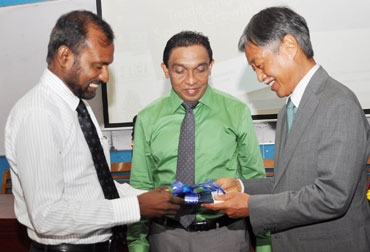Entrepreneurship vital to develop economy - Management Don
Sri Lanka should take a cue from Japan to increase the number of
entrepreneurs who are around four percent at present to around 30
percent, to build a vibrant economy, Former Dean, Faculty of Management
and Finance, University of Colombo, Prof. H.D. Karunaratne told guests
at the launch of the book 'Trade and Spatial Growth: Sharing Images from
Japan and Sri Lanka' authored by Prof. Sirimal Abeyratna and Prof. N.S.
Cooray, in Colombo last week.
|

Prof. N.S. Cooray presents a copy of the book to Japanese
Ambassador Kenichi Suganuma. Prof. Sirimal Abeyratne looks
on. Picture by Sumanachandra
Ariyawansa |
He said only around four percent of the population are owners of
enterprises, whereas in Japan it is around 30 percent, and it has helped
the country to gain rapid economic growth over the years. Sri Lanka has
to increase the number of entrepreneurs to reap the benefits of a free
market economy.
"Export expansion resulted in high economic growth in Japan. Exports
in Japan grew from US$ one billion in 1950 to US$ 800 billion in 2011.
The increase in exports widens economic opportunities creating
entrepreneurs in the country," Prof. Karunaratne said.
Manufactured exports increased rapidly from 1962 to 2010 and Japan's
share of world trade increased from 1948-2007. Public investment is
given precedence in Japan which has helped the country to address
inequality.
Prof. Karunaratne said in Sri Lanka, the Western province accounts
for around 40 percent of the GDP while the rest are lagging behind in
development. Economic growth is dispersed across Japan whereas it is
concentrated to a limited area in Sri Lanka.
"There is a lot Sri Lanka can learn from Japan. This book presents
policy guidelines for Sri Lanka which has growth concentrated in the
Colombo metropolitan area despite decades of policy concern for regional
and rural development," he said.
Unlike the trade-growth nexus, spatial growth has not received much
attention in trade analysis. As countries develop with trade expansion
and global integration, economic activity and people tend to concentrate
in creating dense locations across geographical space, speakers at the
event said.
The study attempts to answer questions such as what would be the
desirable and viable level of concentration versus dispersion?, How can
Sri Lanka face the challenges and create conditions for realizing this
outcome and what role could the government play at central and regional
level.
- LF |

